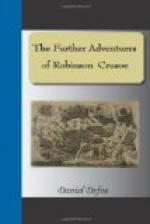We quickly took them from the hut, where the smoke soon drove us out, bound them as we had done the other, and all without any noise. Then we carried them all together to the idol; when we came there, we fell to work with him. First, we daubed him all over, and his robes also, with tar, and tallow mixed with brimstone; then we stopped his eyes and ears and mouth full of gunpowder, and wrapped up a great piece of wildfire in his bonnet; then sticking all the combustibles we had brought with us upon him, we looked about to see if we could find anything else to help to burn him; when my Scotsman remembered that by the hut, where the men were, there lay a heap of dry forage; away he and the other Scotsman ran and fetched their arms full of that. When we had done this, we took all our prisoners, and brought them, having untied their feet and ungagged their mouths, and made them stand up, and set them before their monstrous idol, and then set fire to the whole.
We stayed by it a quarter of an hour or thereabouts, till the powder in the eyes and mouth and ears of the idol blew up, and, as we could perceive, had split altogether; and in a word, till we saw it burned so that it would soon be quite consumed. We then began to think of going away; but the Scotsman said, “No, we must not go, for these poor deluded wretches will all throw themselves into the fire, and burn themselves with the idol.” So we resolved to stay till the forage has burned down too, and then came away and left them. After the feat was performed, we appeared in the morning among our fellow-travellers, exceedingly busy in getting ready for our journey; nor could any man suppose that we had been anywhere but in our beds.
But the affair did not end so; the next day came a great number of the country people to the town gates, and in a most outrageous manner demanded satisfaction of the Russian governor for the insulting their priests and burning their great Cham Chi-Thaungu. The people of Nertsinkay were at first in a great consternation, for they said the Tartars were already no less than thirty thousand strong. The Russian governor sent out messengers to appease them, assuring them that he knew nothing of it, and that there had not a soul in his garrison been abroad, so that it could not be from anybody there: but if they could let him know who did it, they should be exemplarily punished. They returned haughtily, that all the country reverenced the great Cham Chi-Thaungu, who dwelt in the sun, and no mortal would have dared to offer violence to his image but some Christian miscreant; and they therefore resolved to denounce war against him and all the Russians, who, they said, were miscreants and Christians.




